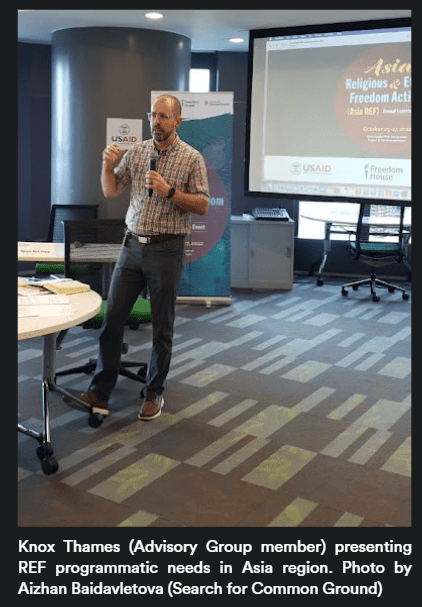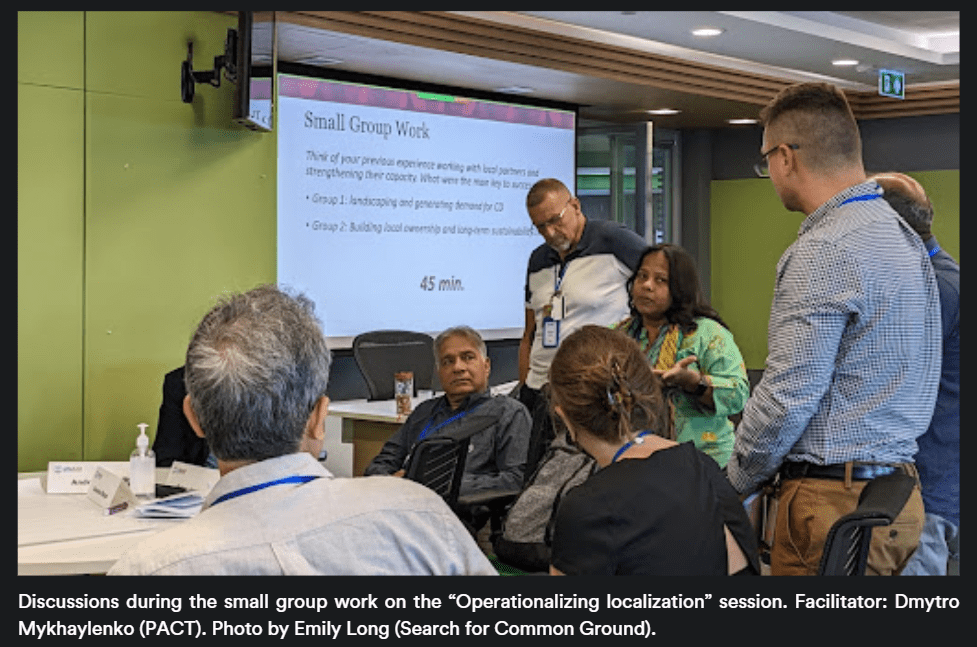On October 25-27, 2022, the first Annual Learning Event in the framework of the Asia Religious and Ethnic Freedom (Asia REF) project was conducted in Bangkok, Thailand. The event was organized by Search for Common Ground (Search) in partnership with Freedom House and with financial support of USAID. Overall, 40 representatives from all consortium partners (Freedom House, Search, Pact, ABA ROLI, and Internews), USAID missions, and Advisory Group members participated in the Annual Learning Event.
Each day of the event was dedicated to different thematic spheres to exchange the partners’ experiences; clarify their questions and concerns; and highlight the ideas, opportunities, and directions to work with in the following years to make the collaboration stronger and more fruitful. 
Overall objectives of the event:
- Discuss main religious and ethnic freedoms challenges in Asia and priority areas for the Asia REF project, and brainstorm consortium approaches that could address those priority areas.
- Identify the learning agenda and annual priority themes for subsequent years of the award.
- Identify how to improve the process of project development.
- Strengthen the collaboration and coordination between USAID/W, Missions, consortium partners, Advisory group, and implementing teams.
Since this event was the first in-person meeting for the project, Day 1 was dedicated to presentations on partners’ experiences and the religious and ethnic freedom (REF) situation in respective regions, including challenges and approaches that are being used to facilitate the work and make changes. Since the Asia REF project is focusing on and aiming to support local actors to promote REF in their countries, participants discussed aspects of engaging with local partners, capacity strengthening, and building local ownership and long-term sustainability within the “Operationalizing localization” session.
Day 2 had particular practical value from the breakout sessions on concept note workshops for four counties: Bangladesh, Sri Lanka, Indonesia, and Kyrgyzstan. In these sessions, country groups identified the REF challenges for each country and came up with the ideas for future Concept Notes. Common for most of the countries was the need to work on intersectionality of FORB and gender, access to education, and state and CSO capacity building to address REF challenges.
Groups also identified country-specific needs. For example, Bangladesh’s group highlighted the necessity to strengthen the understanding of REF violation response mechanisms among CSOs, religious leaders, and practitioners. The Kyrgyzstan team identified the lack of institutional memory and capacity development of relevant State institutions responsible for implementing policies in the religious sphere. The Indonesia group mentioned engaging youth and conservative religious groups, minority faiths, and faith-based organizations to mitigate their exclusion. The Sri Lanka team focused on creating alternative narratives to increase humanization as a foundational element of tolerance and on working with social media to build a healthy Media Space to bring together all actors work on hate speech and FoRB.
 Day 3 was dedicated to discussing the programmatic challenges and opportunities, communications strategies, next year plans, and learning agenda. Consortium partners discussed ways to operationalize the communication process and share learning among Asia REF partners.
Day 3 was dedicated to discussing the programmatic challenges and opportunities, communications strategies, next year plans, and learning agenda. Consortium partners discussed ways to operationalize the communication process and share learning among Asia REF partners.
Overall, the first Annual Learning Event for the Asia REF project was a successful opportunity for consortium partners, USAID missions, and Advisory Group members to exchange experiences, clarify questions and concerns, and identify ideas, opportunities, and directions for future collaboration. The event focused on discussing the most forefront religious and ethnic freedoms challenges in Asia and brainstorming approaches to address these issues, as well as identifying the learning agenda and priority themes for subsequent years of the award and improving the process of project development. The event also provided a chance to strengthen the coordination between all stakeholders. Through practical sessions and discussions, action points were identified to guide future efforts and help address challenges.
To learn more about Asia REF project and see related resources, please visit this page.

This resource is made possible by the support of the American people through the United States Agency for International Development (USAID). The contents are the sole responsibility of Search for Common Ground and do not necessarily reflect the views of USAID or the United States Government.

You must be logged in in order to leave a comment